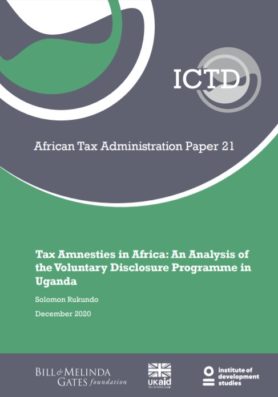African Tax Administration Paper 21
Tax amnesties have taken centre stage as a compliance tool in recent years. The OECD estimates that since 2009 tax amnesties in 40 jurisdictions have resulted in the collection of an additional €102 billion in tax revenue. A number of African countries have introduced tax amnesties in the last decade, including Nigeria, Namibia, South Africa and Tanzania. Despite their global popularity, the efficacy of tax amnesties as a tax compliance tool remains in doubt. The revenue is often below expectations, and it probably could have been raised through effective use of regular enforcement measures. It is also argued that tax amnesties might incentivise non-compliance – taxpayers may engage in non-compliance in the hope of benefiting from an amnesty. This paper examines the administration of tax amnesties in various jurisdictions around the world, including the United States, Australia, Canada, Kenya and South Africa. The paper makes a cost-benefit analysis of these and other tax amnesties – and from this analysis develops a model tax amnesty, whose features maximise the benefits of a tax amnesty while minimising the potential costs. The model tax amnesty: (1) is permanent, (2) is available only to taxpayers who make a voluntary disclosure, (3) relieves taxpayers of penalties, interest and the risk of prosecution, but treats intentional and unintentional non-compliance differently, (4) has clear reporting requirements for taxpayers, and (5) is communicated clearly to attract non-compliant taxpayers without appearing unfair to the compliant ones.

